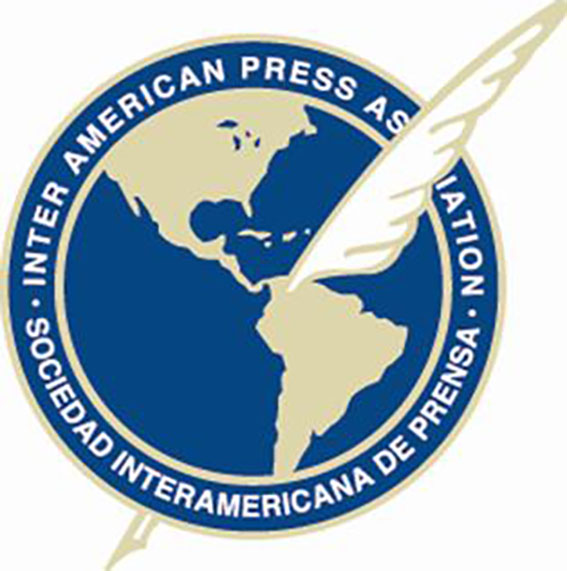The Inter American Press Association (IAPA) has expressed concern over the ever increasing stifling of freedom of expression and harassment of journalists in the Americas.
This is one of several conclusions arrived at when the IAPA yesterday wrapped up its semi-annual meeting which was held virtually, with the presentation of its findings after three days of debate on the situation of press freedom in the Western Hemisphere and a series of panels related to the update of the 2018 Declaration of Salta of Principles on Freedom of Expression in the Digital Era, in light of the technological changes of recent years, an IAPA release stated yesterday.
Among its conclusions, the Association noted that the year 2024 has so far been an intense electoral year for the continent, with growing risks to freedom of expression and the press. It noted that instances of intolerance from politicians with high chances of coming to power and from authorities in various countries, serve to “darken the outlook” for journalism.
According to the release, in this context, political discourse advocates direct communication with the public. As such, it enhances confrontation with media and journalists through spying practices, online harassment, and strategic lawsuits against public participation aimed at silencing critical voices. At the same time, in some countries, imprisonment, forced exile, or deportations of journalists come equally from state actors and organised crime.
The IAPA went on to catalogue the attacks on journalists across the region. In Guatemala, Honduras, Colombia, Haiti, and Mexico, seven journalists were killed while another four remain imprisoned in Cuba and Guatemala. Also, in this semester, there were reported cases of journalists being kidnapped in Haiti and Mexico. Several instances of attacks and stigmatization were recorded in Brazil, Bolivia, Chile, Costa Rica, Cuba, Ecuador, El Salvador, Haiti, Honduras, Nicaragua, Panama, Peru, Venezuela, Colombia, Argentina, and Mexico. The presidents of the last three countries, it added, often refer negatively to journalists through their social media networks and the mainstream media.
Also in Nicaragua, the regime has dismantled the independent press and in addition to confiscations, imprisonment, and subsequent exile of editors and journalists, added persecution against family members and looting of homes and bank accounts of those who maintain a critical voice. The Special Cybercrime Law was designed, and it is being used to persecute any critical expression on social media against the official discourse.
In Cuba and Venezuela, persecution against the few journalists who manage to express themselves and against citizens translates into economic sanctions, blocking of channels of expression, stigmatisation, and harassment in public places.
At the meeting, an in-depth analysis was conducted into the spread of intimidation and attacks by drug traffickers against the press in Guatemala, Ecuador, and Argentina, the latter country being until recently immune to this scourge. Also discussed was the impact of political hostility towards the press during elections in the United States, El Salvador, Mexico, and Venezuela.
The release pointed out that judicial harassment continues to be a strategy used in several countries to silence the press. In Brazil, Costa Rica, Mexico, Panama, Paraguay, Uruguay, and Venezuela, cases of judicial harassment were recorded, some through criminal lawsuits and others through civil lawsuits in which judges admit disproportionate damages that thwart press freedom. And in other countries such as Nicaragua, Peru, and Venezuela, governments maintain surveillance mechanisms against journalists. Freedom of expression was also curtailed by denying access to public information to both citizens and journalists in Bolivia, the United States, El Salvador, Nicaragua, Paraguay, Puerto Rico, and Venezuela.
IAPA also took note of legislative projects or worrying judicial trends for freedom of expression. For example, according to the Supreme Court of Brazil, the media would be responsible for defamation or libel expressed by interviewees. In Canada, a bill criminalises public expression online and in Peru, a legislative project seeks to increase penalties against officials who disclose irregularities to the press.
The meeting also analyzed the impact of IAPA missions to Colombia, Guatemala, and Ecuador, the progress of the Safer Newsrooms program, and the status of initiatives related to journalists in exile. Five panels addressed disputes and agreements between media and technology companies, from alliances with artificial intelligence developers and analysis of new agreements to regulations regarding copyright, abuse of dominant position, and payment of compensation to content authors.
It must be noted however, that is has not been all ‘doom and gloom’ for journalists in the region, with the Association stating that there are projects, resolutions, and governmental actions that deserve to be highlighted.
The Chilean Senate, is enacting a law to protect journalists during coverage and in Panama, a bill proposes to regulate official advertising, and another seeks to protect against judicial harassment. In Puerto Rico, the Judiciary has issued a ruling reaffirming the confidentiality of information sources, while in Costa Rica, the Constitutional Court admitted an injunction against a minister for failing to provide public information. In Colombia, after investigations by the IAPA, an act of recognition was held for Guillermo Cano, while in Ecuador, President Daniel Noboa signed the Chapultepec and Salta declarations, the release added.





